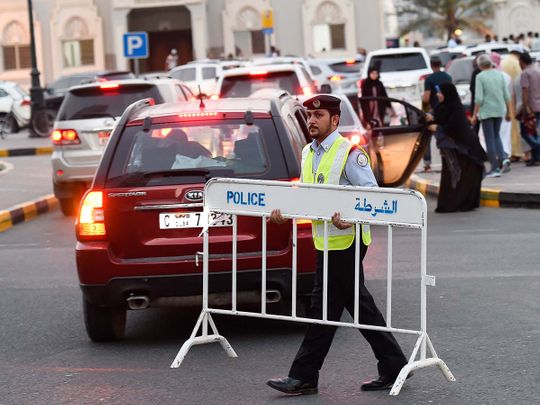
Sharjah: Sharjah Police are urging residents who are witnesses or victims of a crime to leave the scene untouched until specialist officers arrive.
The Sharjah Criminal Scene Investigation department said the main obstacle they faced was people cleaning up or moving objects.
“It is vital that people don’t touch anything until the police arrive. It is without doubt the most important thing that residents can do to help investigators,” Lieutenant Colonel Khalfan Ali Al Naqbi, Head of Crime Scene Investigation Section, told Gulf News in an exclusive interview.
Residents whose cars have been broken into should call the police immediately. “One woman who had her car broken into took the car for repairs before cleaning it. She waited for two days to report the theft to the police, by which point most of the evidence had been tampered with,” Lt Col Al Naqbi said some residents felt they had to clean up before police arrived, making it difficult for crime scene investigation teams to lift fingerprints and collect evidence.
Most of criminal cases had been solved in Sharjah in 2020, Lt. Col. Al Naqbi said, and no criminal case was recorded against an unidentified person.
Key to investigation
Crime scene investigation, he said, is key to solving cases and the ability to recognise and properly collect physical evidence is crucial to achieving success. “It is no exaggeration to say that in the majority of cases, the law enforcement officer who secures and searches a crime scene plays a critical role in determining whether physical evidence will be used in solving or prosecuting crimes,” Lt Col Al Naqbi said.
Sharjah Police’s forensics department and crime scene investigation section today produces ten times as much evidence as before, helping to solve more crimes, Lt Col Al Naqbi said. Police can now gather not only fingerprints but also the unique signature left on a single bullet fired from a gun.
Crime scene investigators (CSI) work in groups and include evidence technicians, crime scene analysts, forensic investigators and prosecutors. Crime scene investigations and forensic lab work requires highly educated individuals with a background in forensic science, the natural sciences, and the criminal justice system, he said.
The importance of crime scenes helps to uncover the mystery of cases and contributes to the conviction or innocence of the accused, Lt. Col. Al Naqbi said. In one incident, a motorist without a driving licence was involved in a crash and ran away from the scene. Police investigation revealed that the person was involved in a number of crimes and he was wanted by security authorities.
Challenges
Difficulty in moving to the crime scene during COVID-19 was the biggest challenge to the team as they would have to ascertain first whether the people in the scene had COVID-19. However, none of the team members were affected as they dealt with the situation carefully at the site, Lt. Col. Al Naqbi said.
The section will coordinate with universities to conduct research on crime scene matters.
Sharjah Police trains personnel in underwater crime detection
Digging of bodies, identifying fingerprints and collecting evidence underwater by specially trained personnel are the latest techniques being adopted by Sharjah Police’s crime scene department to crack down on crimes in the city’s water bodies.
* Protecting the evidence.
* Searching, collecting and putting the evidence in special containers.
* Identifying fingerprints.
Challenges of investigating underwater:
* Low visibility.
* Weather changes.
* Underwater wave conditions
A team of experts department recently completed specialised training to develop their skills in collecting evidence from underwater crime scenes. Police said this is the first endeavour of its kind in the region.
“This team is part of Sharjah police plan to shape the future of crime detection. We have experts comprising the underwater crime section, the team are practicing their duties,” an officer said.








